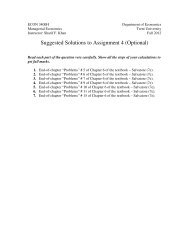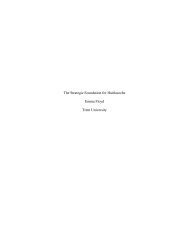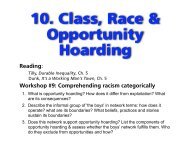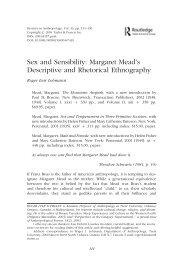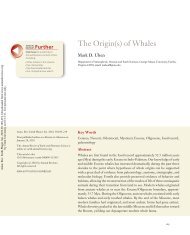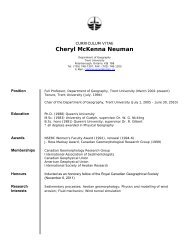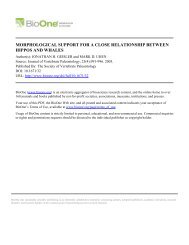REO FORTUNE'S PSYCHOLOGICAL THEORY OF CULTURAL ...
REO FORTUNE'S PSYCHOLOGICAL THEORY OF CULTURAL ...
REO FORTUNE'S PSYCHOLOGICAL THEORY OF CULTURAL ...
Create successful ePaper yourself
Turn your PDF publications into a flip-book with our unique Google optimized e-Paper software.
274 Pacifi c Studies, Vol. 32, Nos. 2/3—June/Sept. 2009<br />
associates at certain points in his life, here I look to what we can learn<br />
about Reo Fortune’s personality and scholarly motives before his fateful<br />
association with Mead and Benedict. The fact that Benedict, and later<br />
Gregory Bateson, were competitors for Mead’s love, added emotional complications<br />
to Fortune’s scholarly relationships with each of these figures in<br />
distinctive ways (see Molloy 2009 and Thomas 2009). Here I am interested<br />
in who Reo Fortune was before life threw him the curve ball of meeting<br />
Mead, which helped motivate him to leave psychology in favor of<br />
anthropology (for other factors, see Gray 1999; Thomas 2009).<br />
My main source is a little-known book on dreaming that Fortune<br />
published at the age of 24, titled The Mind in Sleep (1927). It was a work<br />
in progress when he met Margaret Mead on a ship from Australia to Europe<br />
in 1926 (Mead 1972: 169–80). While he anonymously included some of<br />
Mead’s dreams in it (Banner 2003, 264; Lapsley 1999: 149–50), he also<br />
included six of his own that reveal much about his views before his association<br />
with Mead. We have here a glimpse of the young man’s trials, ideals,<br />
and scholarly persona.<br />
The man who emerges from this book is an emotionally sensitive,<br />
brilliantly thoughtful character who devoted considerable effort toward<br />
tackling difficult moral issues, particularly those involving conflicting views<br />
and perspectives. We learn that Fortune was a liberal, an agnostic, a<br />
biological materialist, an antinationalist, and a pacifist. He was also keenly<br />
aware of the perspectives of others and how differing views influenced<br />
relationships. A widely read scholar with a strong foundation in psychology,<br />
he fearlessly and respectfully challenged the orthodoxies of intellectual<br />
giants like Sigmund Freud ([1900] 1965) and W. H. R. Rivers (1923), the<br />
Cambridge psychologist and ethnologist. Fortune focused on dreams in<br />
which one acts or thinks in ways contrary to one’s waking views to theorize<br />
about dreams without one’s own theory influencing dream content. This<br />
perspective provides an opportunity for us to see some of Fortune’s struggles<br />
with competing drives surrounding the First World War (also called<br />
the Great War), his abandonment of Christianity, and his love of scholarly<br />
order.<br />
Fortune’s theory of self-contrary dreams pointed his ethnographic work<br />
to problems of dreaming and ambivalence and encouraged his rejection<br />
of stereotyping. Though of little influence when published, Fortune’s<br />
book prefigures some developments in the psychology and anthropology<br />
of dreaming. Finally, The Mind in Sleep provides a model of cultural<br />
ambivalence and dynamism of continuing usefulness by showing how<br />
individuals can hold contradictory cultural views simultaneously.<br />
pacs-32-02-06.indd 274 9/7/2009 2:32:33 PM



